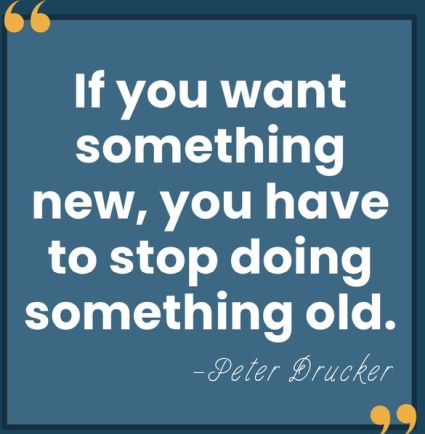The one common theme across virtually everyone I talk to is they are overloaded, overwhelmed, time-poor. It doesn’t matter whether they are a SDR, marketer, customer service rep, rev-ops person, AE/AM, manager or a senior executive. They are overwhelmed!
One would think with all the AI tools that do so much of the work for us, that this would become more manageable. That we would free up time, able to focus on more impactful work. But that doesn’t seem to be happening, in fact it appears to be the opposite, we have one more set of technologies, one more set of things to monitor and use our time.
The thing that constantly amazes me is that as we add more to our calendars, to-do lists, tech stacks, programs; we seldom think about, “What are we stopping?”
It’s so easy just to add something more to the pile. But everything we add has an opportunity cost. Perhaps we aren’t spending enough time on the other “important things.” Or we juggle priorities, calendars, and tasks, constantly pushing off other things that should get done, but aren’t. We think we can manage it, or that it doesn’t take much space, but everything has an adverse impact on what we are trying to achieve.
And then we measure the ripple effect of these constant shifts of attention, priorities, and activities. We don’t work in isolation, so anything we don’t do is likely to have an impact on others. And that then ripples through to still more people, whether in our own organizations or in our customers.’
Some of these things may not be big, but collectively, when viewed through the organization they have a snowball effect, both on what we achieve and those we work with.
If we aren’t intentional and purposeful about what we do, where we invest our time; we are by default choosing to invest our time, attention, and money on things that may no longer matter. We become committed to keeping things alive–doing things because we’ve always done it, measuring the same things because they are easy to track, or continuing because we simply aren’t paying attention.
Or we are committed to the sunk cost fallacy. We have invested so much of ourselves, resources, and time, that we are afraid to admit it never was working.
Imagine, if for every new initiative, you are required to stop at least one, preferably two, things that you are already doing.
If you can’t think of one thing you’ve stopped in the past 90 days, you’ve simply stopped paying attention.
Try running meetings focused on the question: What are we stopping?
Make “What are we stopping,” a standard question in all leadership and team meetings. Assess everything based on:
- Are they aligned with our current strategies, goals, and priorities/
- Is there clear ownership and accountability/
- Is it something we’ve just always done?
- Does it consume more time/resources/attention than the value it creates?
- Does it keep us from doing more important things?
- Can we clearly measure whether it’s producing what we want–and are we focused on measuring outcomes.
And never add anything new, without stopping something that is at least equal in the time/attention/resources required.
Afterword: Here is an outstanding AI based discussion of this post. Enjoy!

Leave a Reply